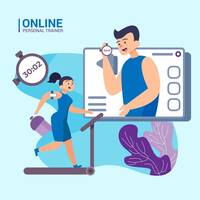
29 Jul How Can New Technology Create Personalized Wellness Plans?
 Imagine a world where your health plan is as unique as your fingerprint. That’s not a far-off dream – it’s happening right now. In 2022, the global wellness industry hit a staggering $5.6 trillion, showing just how much people care about their health.
Imagine a world where your health plan is as unique as your fingerprint. That’s not a far-off dream – it’s happening right now. In 2022, the global wellness industry hit a staggering $5.6 trillion, showing just how much people care about their health.
But here’s the thing: we’re all different. What works for your neighbor might not work for you. That’s where personalized wellness plans come in, and they’re getting a big boost from technology.
Think of it as having a super-smart health coach in your pocket. Thanks to AI in healthcare, we can now crunch huge amounts of data to create health plans that fit you perfectly. From your DNA to your daily habits, these tech tools consider it all.
This article will explore how these amazing technological advancements are changing the game in wellness. We’ll see how they’re making it possible to create health strategies that are truly tailored to you, helping everyone live their best, healthiest life.
How AI is Shaping the Future of Personal Health
AI is revolutionizing how we approach personal health and wellness. Here’s how these technologies are changing the game:
Smart Watches and Fitness Trackers: Your Personal Health Assistant
 Wearable devices like smartwatches and fitness trackers have become like tiny health assistants we wear on our wrists. These gadgets do much more than just count steps. They can track your heart rate, monitor your sleep patterns, and even detect when you’re feeling stressed.
Wearable devices like smartwatches and fitness trackers have become like tiny health assistants we wear on our wrists. These gadgets do much more than just count steps. They can track your heart rate, monitor your sleep patterns, and even detect when you’re feeling stressed.
For health coaches, this information is gold. Instead of relying on what you remember to tell them, they can see exactly how active you’ve been, how well you’ve slept, and even how your heart rate changes throughout the day.
For example, if your tracker shows you’re not sleeping well, your coach might suggest changes to your bedtime routine. Or if it notices you’re most active in the evenings, they might adjust your exercise plan to fit that pattern.
These devices make it possible to create personalized health plans that change as your habits and health change. It’s like having a health coach with you 24/7, always ready to help you make the best choices for your well-being.
Health Apps: Your Pocket Wellness Guide
Health apps have become like having a wellness center right in your pocket. There’s an app for almost every aspect of health – from counting calories and tracking workouts to guiding meditations and monitoring moods.
These apps do more than just collect data. They help you set goals, remind you to stick to healthy habits, and even give you compliments when you’re doing well. It’s like having a supportive friend always cheering you on to be healthier.
For health coaches, these apps are a powerful tool. They can see how you’re doing between sessions, which helps them give you better advice. If they notice you’re struggling with a certain goal, they can reach out and offer support or adjust your plan.
For example, if you’re using a food-tracking app, your coach might notice you’re not eating enough protein and suggest some easy ways to add more to your diet. Or if a meditation app shows you’re not sticking to your mindfulness practice, it might help you find a better time in your day for it.
AI-Powered Health Coaching: Your Smart Wellness Partner
Artificial Intelligence is making health coaching smarter than ever. AI can look at all the data from your wearables and apps, spot patterns you might miss, and suggest personalized strategies to improve your health.
For instance, AI might notice that you tend to eat unhealthy snacks when you’ve had a bad night’s sleep. It could then suggest ways to improve your sleep or healthier snack options for those tired days.
Some health programs now use AI chatbots that can answer your questions anytime, day or night. These aren’t just pre-programmed responses—they can learn from your conversations and give advice tailored to your specific situation.
While AI can’t replace human coaches, it can make them much more effective. AI can handle routine check-ins and basic questions, allowing human coaches to focus on more complex issues and providing deeper, more personalized support.
Virtual Health Visits: Care from Anywhere
Telehealth is like having a doctor’s office in your living room. It lets you talk to health experts through video calls or messages, no matter where you are.
This technology is a game-changer, especially for people who live far from big cities or have trouble getting to a doctor’s office. Now, you can get expert health advice without long trips or waiting rooms.
For example, if you live in a small town, you might not have easy access to a nutritionist. But with telehealth, you could video chat with someone hundreds of miles away. They can look at your food diary, discuss your goals, and create a personalized eating plan, all without you leaving home.
Telehealth also makes it easier to fit health care into your busy life. You can schedule quick check-ins during your lunch break or get help with a sudden health question late at night. This flexibility means you’re more likely to stick with your wellness plan and get the support you need when you need it.
All-in-One Health Platforms: Your Wellness Hub
Imagine having all your health information in one place – that’s what integrative health platforms do. These smart-systems pull together data from your fitness tracker, food diary app, sleep monitor, and more to give a complete picture of your health.
For health coaches, these platforms are like having a super-powered health detective. They can spot patterns you might miss, like how your sleep affects your food choices or how your stress levels impact your exercise habits.
Let’s say your coach notices that on days when you eat more protein at breakfast, you tend to exercise more in the evening. They might suggest tweaking your morning meals to help you meet your fitness goals.
One health coach used an integrative platform to help a client with high blood pressure. By looking at data from the client’s smartwatch, food tracking app, and home blood pressure monitor, the coach created a personalized plan that lowered the client’s blood pressure without medication.
These platforms make it possible to create truly holistic health plans that consider all aspects of your life and health, leading to better, more personalized results.
DNA-Based Health Plans: Tailored to Your Genes
 Genetic profiling is like getting a user manual for your body. By looking at your DNA, health experts can create super-personalized wellness plans that work with your unique genetic makeup.
Genetic profiling is like getting a user manual for your body. By looking at your DNA, health experts can create super-personalized wellness plans that work with your unique genetic makeup.
This technology can tell you whether you’re likely to benefit more from strength training or endurance exercises or if you might be sensitive to certain foods.
For example, if your genetic profile shows you process caffeine slowly, your health coach might suggest cutting off coffee earlier in the day to improve your sleep. Or if your genes indicate a higher risk for vitamin D deficiency, they might recommend more sun exposure or specific supplements.
While this technology is exciting, it’s important to remember that genes aren’t destiny. Your lifestyle choices still play a huge role in your health. Also, it’s crucial that this kind of personal information is kept private and used ethically.
Health coaches using genetic data need to be extra careful about protecting your information and ensuring you understand how it’s being used. They should always get your permission before using this data and explain how it will help create your wellness plan.
Conclusion
These advancements are making it possible to create wellness plans that fit our individual needs like never before. They’re helping us understand our bodies better and make healthier choices.
But it’s important to remember that technology is just a tool. The real power comes from how we use it. Health coaches and medical professionals will still play a crucial role in interpreting all this data and providing the human support we need.
As we move forward, the key will be finding the right balance between high-tech solutions and human care. That’s how we’ll truly unlock the potential of personalized wellness for everyone.
The information on MedicalResearch.com is provided for educational purposes only, and is in no way intended to diagnose, cure, or treat any medical or other condition.
Some links may be sponsored. Products are not warranted or endorsed.
Always seek the advice of your physician or other qualified health and ask your doctor any questions you may have regarding a medical condition. In addition to all other limitations and disclaimers in this agreement, service provider and its third party providers disclaim any liability or loss in connection with the content provided on this website
Last Updated on August 2, 2024 by Marie Benz MD FAAD
